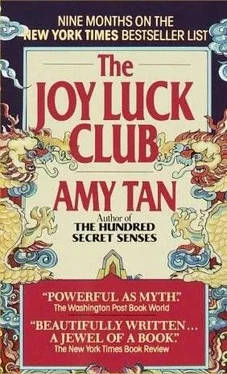"Ma, I can't practice when you stand there like that," I said one day. She retreated to the kitchen and made loud noises with the pots and pans. When the crashing stopped, I could see out of the corner of my eye that she was standing in the doorway. "Hmmmph!" Only this one came out of her tight throat.
My parents made many concessions to allow me to practice. One time I complained that the bedroom I shared was so noisy that I couldn't think. Thereafter, my brothers slept in a bed in the living room facing the street. I said I couldn't finish my rice; my head didn't work right when my stomach was too full. I left the table with half-finished bowls and nobody complained. But there was one duty I couldn't avoid. I had to accompany my mother on Saturday market days when I had no tournament to play. My mother would proudly walk with me, visiting many shops, buying very little. "This my daughter Wave-ly Jong," she said to whoever looked her way.
One day, after we left a shop I said under my breath, "I wish you wouldn't do that, telling everybody I'm your daughter." My mother stopped walking. Crowds of people with heavy bags pushed past us on the sidewalk, bumping into first one shoulder, then another.
"Aiii-ya. So shame be with mother?" She grasped my hand even tighter as she glared at me.
I looked down. "It's not that, it's just so obvious. It's just so embarrassing."
"Embarrass you be my daughter?" Her voice was cracking with anger.
"That's not what I meant. That's not what I said."
"What you say?"
I knew it was a mistake to say anything more, but I heard my voice speaking. "Why do you have to use me to show off? If you want to show off, then why don't you learn to play chess."
My mother's eyes turned into dangerous black slits. She had no words for me, just sharp silence.
I felt the wind rushing around my hot ears. I jerked my hand out of my mother's tight grasp and spun around, knocking into an old woman. Her bag of groceries spilled to the ground.
"Aii-ya! Stupid girl!" my mother and the woman cried. Oranges and tin cans careened down the sidewalk. As my mother stooped to help the old woman pick up the escaping food, I took off.
I raced down the street, dashing between people, not looking back as my mother screamed shrilly, "Meimei! Meimei!" I fled down an alley, past dark curtained shops and merchants washing the grime off their windows. I sped into the sunlight, into a large street crowded with tourists examining trinkets and souvenirs. I ducked into another dark alley, down another street, up another alley. I ran until it hurt and I realized I had nowhere to go, that I was not running from anything. The alleys contained no escape routes.
My breath came out like angry smoke. It was cold. I sat down on an upturned plastic pail next to a stack of empty boxes, cupping my chin with my hands, thinking hard. I imagined my mother, first walking briskly down one street or another looking for me, then giving up and returning home to await my arrival. After two hours, I stood up on creaking legs and slowly walked home.
The alley was quiet and I could see the yellow lights shining from our flat like two tiger's eyes in the night. I climbed the sixteen steps to the door, advancing quietly up each so as not to make any warning sounds. I turned the knob; the door was locked. I heard a chair moving, quick steps, the locks turning-click! click! click!-and then the door opened.
"About time you got home," said Vincent. "Boy, are you in trouble."
He slid back to the dinner table. On a platter were the remains of a large fish, its fleshy head still connected to bones swimming upstream in vain escape. Standing there waiting for my punishment, I heard my mother speak in a dry voice.
"We not concerning this girl. This girl not have concerning for us."
Nobody looked at me. Bone chopsticks clinked against the insides of bowls being emptied into hungry mouths.
I walked into my room, closed the door, and lay down on my bed. The room was dark, the ceiling filled with shadows from the dinnertime lights of neighboring flats.
In my head, I saw a chessboard with sixty-four black and white squares. Opposite me was my opponent, two angry black slits. She wore a triumphant smile. "Strongest wind cannot be seen," she said.
Her black men advanced across the plane, slowly marching to each successive level as a single unit. My white pieces screamed as they scurried and fell off the board one by one. As her men drew closer to my edge, I felt myself growing light. I rose up into the air and flew out the window. Higher and higher, above the alley, over the tops of tiled roofs, where I was gathered up by the wind and pushed up toward the night sky until everything below me disappeared and I was alone.
I closed my eyes and pondered my next move.
Lena St. Clair
When I was little, my mother told me my great-grandfather had sentenced a beggar to die in the worst possible way, and that later the dead man came back and killed my great-grandfather. Either that, or he died of influenza one week later.
I used to play out the beggar's last moments over and over again in my head. In my mind, I saw the executioner strip off the man's shirt and lead him into the open yard. "This traitor," read the executioner, "is sentenced to die the death of a thousand cuts." But before he could even raise the sharp sword to whittle his life away, they found the beggar's mind had already broken into a thousand pieces. A few days later, my great-grandfather looked up from his books and saw this same man looking like a smashed vase hastily put back together. "As the sword was cutting me down," said the ghost, "I thought this was the worst I would ever have to endure. But I was wrong. The worst is on the other side." And the dead man embraced my great-grandfather with the jagged pieces of his arm and pulled him through the wall, to show him what he meant.
I once asked my mother how he really died. She said, "In bed, very quickly, after being sick for only two days."
"No, no, I mean the other man. How was he killed? Did they slice off his skin first? Did they use a cleaver to chop up his bones? Did he scream and feel all one thousand cuts?"
"Annh! Why do you Americans have only these morbid thoughts in your mind?" cried my mother in Chinese. "That man has been dead for almost seventy years. What does it matter how he died?"
I always thought it mattered, to know what is the worst possible thing that can happen to you, to know how you can avoid it, to not be drawn by the magic of the unspeakable. Because, even as a young child, I could sense the unspoken terrors that surrounded our house, the ones that chased my mother until she hid in a secret dark corner of her mind. And still they found her. I watched, over the years, as they devoured her, piece by piece, until she disappeared and became a ghost.
As I remember it, the dark side of my mother sprang from the basement in our old house in Oakland. I was five and my mother tried to hide it from me. She barricaded the door with a wooden chair, secured it with a chain and two types of key locks. And it became so mysterious that I spent all my energies unraveling this door, until the day I was finally able to pry it open with my small fingers, only to immediately fall headlong into the dark chasm. And it was only after I stopped screaming-I had seen the blood of my nose on my mother's shoulder-only then did my mother tell me about the bad man who lived in the basement and why I should never open the door again. He had lived there for thousands of years, she said, and was so evil and hungry that had my mother not rescued me so quickly, this bad man would have planted five babies in me and then eaten us all in a six-course meal, tossing our bones on the dirty floor.
Читать дальше












